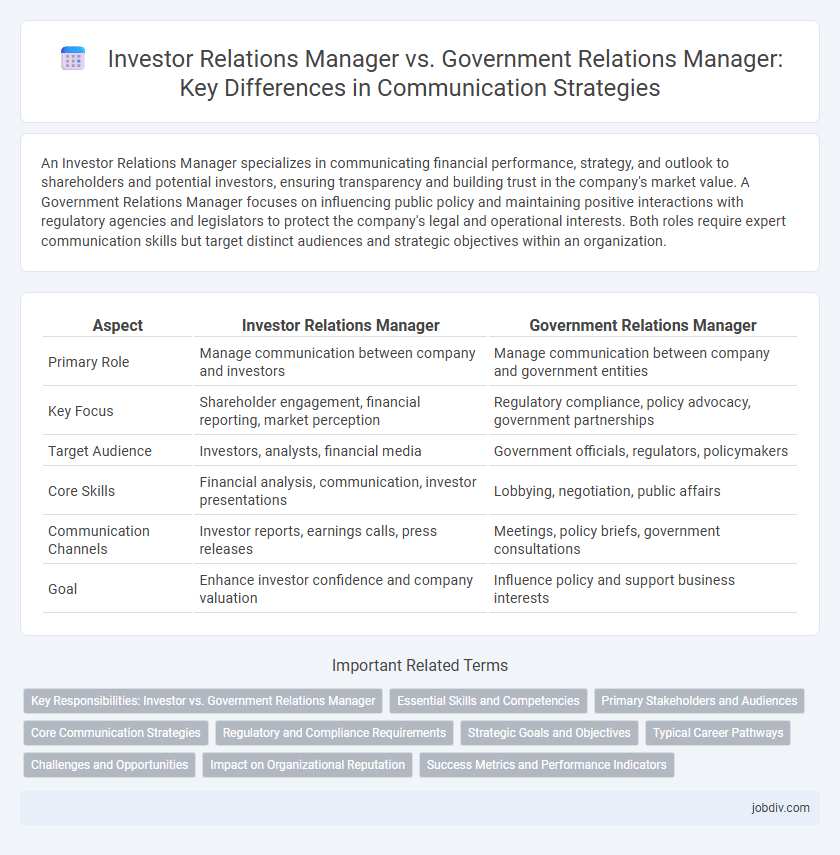An Investor Relations Manager specializes in communicating financial performance, strategy, and outlook to shareholders and potential investors, ensuring transparency and building trust in the company's market value. A Government Relations Manager focuses on influencing public policy and maintaining positive interactions with regulatory agencies and legislators to protect the company's legal and operational interests. Both roles require expert communication skills but target distinct audiences and strategic objectives within an organization.
Table of Comparison
| Aspect | Investor Relations Manager | Government Relations Manager |
|---|---|---|
| Primary Role | Manage communication between company and investors | Manage communication between company and government entities |
| Key Focus | Shareholder engagement, financial reporting, market perception | Regulatory compliance, policy advocacy, government partnerships |
| Target Audience | Investors, analysts, financial media | Government officials, regulators, policymakers |
| Core Skills | Financial analysis, communication, investor presentations | Lobbying, negotiation, public affairs |
| Communication Channels | Investor reports, earnings calls, press releases | Meetings, policy briefs, government consultations |
| Goal | Enhance investor confidence and company valuation | Influence policy and support business interests |
Key Responsibilities: Investor vs. Government Relations Manager
Investor Relations Managers focus on building transparent communication with shareholders, analyzing financial data, and preparing quarterly earnings reports to maintain investor confidence. Government Relations Managers engage with policymakers, monitor regulatory developments, and advocate for favorable legislation to support organizational objectives. Both roles require strategic communication skills, but Investor Relations prioritizes financial reporting and market perception, while Government Relations centers on policy influence and regulatory compliance.
Essential Skills and Competencies
Investor Relations Managers excel in financial analysis, strategic communication, and stakeholder engagement to effectively present company performance to shareholders and analysts. Government Relations Managers prioritize policy analysis, regulatory compliance, and lobbying skills to influence legislation and maintain positive relationships with public officials. Both roles demand exceptional communication, negotiation, and crisis management abilities tailored to their specific external audiences.
Primary Stakeholders and Audiences
Investor Relations Managers primarily engage with shareholders, financial analysts, and institutional investors to communicate company performance and strategies, ensuring transparent financial disclosures. Government Relations Managers focus on regulators, policymakers, and public officials to influence legislation and regulatory conditions affecting the organization. Both roles require targeted communication strategies tailored to distinct stakeholder groups crucial for organizational success and compliance.
Core Communication Strategies
Investor Relations Managers prioritize transparent financial reporting and targeted earnings communication to sustain shareholder confidence and market valuation, leveraging quarterly reports and investor presentations. Government Relations Managers concentrate on policy advocacy and regulatory updates, utilizing strategic lobbying and stakeholder engagement to influence legislation favorable to the organization. Both roles employ tailored messaging and stakeholder-specific outreach but diverge in their communication targets and regulatory environments.
Regulatory and Compliance Requirements
Investor Relations Managers primarily focus on ensuring transparent communication with shareholders and compliance with stock exchange regulations such as SEC filings and financial disclosure requirements. Government Relations Managers specialize in navigating legislative and regulatory environments, managing interactions with policymakers to influence compliance with sector-specific laws and government mandates. Both roles require a deep understanding of regulatory frameworks but target different stakeholders and compliance priorities within communication strategies.
Strategic Goals and Objectives
Investor Relations Managers focus on enhancing shareholder value through transparent financial communication, aligning their strategic goals with company performance and market expectations. Government Relations Managers prioritize influencing public policy and regulatory environments, aiming to secure favorable legislative outcomes that support organizational interests. Both roles demand strategic alignment with broader corporate objectives but target distinct stakeholder groups for effective communication and relationship management.
Typical Career Pathways
Investor Relations Managers typically advance from finance, communications, or marketing roles, gaining expertise in financial analysis, shareholder communication, and corporate strategy to effectively manage investor communications and enhance company valuation. Government Relations Managers often begin their careers in public policy, regulatory affairs, or legislative roles, developing skills in lobbying, stakeholder engagement, and policy analysis to influence governmental decisions and regulatory compliance. Both career paths demand strong communication skills and the ability to navigate complex stakeholder networks, but Investor Relations focuses more on financial markets while Government Relations centers on public sector interaction and policy advocacy.
Challenges and Opportunities
Investor Relations Managers face challenges in maintaining transparent communication with diverse stakeholders while navigating financial regulations and market volatility, presenting opportunities to build investor trust and influence capital flow. Government Relations Managers encounter complexities in regulatory compliance and policy advocacy, creating opportunities to shape legislation and foster strategic partnerships between businesses and government entities. Both roles require strategic communication skills to bridge organizational goals with external expectations effectively.
Impact on Organizational Reputation
Investor Relations Managers enhance organizational reputation by fostering transparent communication and trust with shareholders and financial analysts, directly influencing stock market perception and investment confidence. Government Relations Managers shape reputation through strategic engagement with policymakers and regulatory bodies, ensuring compliance and facilitating favorable legislative outcomes. Both roles are critical in sustaining a positive organizational image, but Investor Relations focus on financial credibility while Government Relations emphasize regulatory legitimacy.
Success Metrics and Performance Indicators
Investor Relations Managers are evaluated based on stock price stability, shareholder engagement levels, earnings report accuracy, and quarterly financial disclosure timelines, emphasizing market confidence and investment attraction. Government Relations Managers are measured by policy influence effectiveness, regulatory compliance rates, the success of legislative advocacy, and the strength of relationships with government officials, focusing on risk mitigation and favorable legal outcomes. Both roles require tracking communication impact but differ in prioritizing market-driven metrics versus regulatory and political engagement indicators.
Investor Relations Manager vs Government Relations Manager Infographic

 jobdiv.com
jobdiv.com